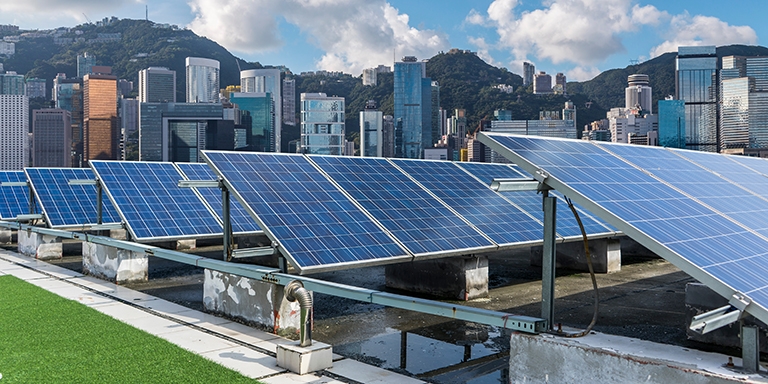Hong Kong Trade Development Council (HKTDC) Research held a webinar, "The Road to Zero Carbon: Measuring Carbon Footprint", last month, inviting industry experts to advise SMEs on how to use the three categories of greenhouse gas emissions to measure and reduce their carbon dioxide footprints, and to practice carbon-reduction production methods in a way that can be reliably measured.
Louis Chan, Principal Economist of Global Markets at HKTDC Research, pointed out that as governments around the world actively promote environmental protection policies, more companies are focusing on carbon and emissions to pursue sustainable development while maintaining profitable operations.

Climate blueprint
Nicholas Fu, Global Research Economist at HKTDC, said global greenhouse gas emission standards for the entire production chain are separated into three categories. The first category is the manufacturer's greenhouse gas emissions generated by making products. The second is those from power companies supplying electricity to the firm, and the third is the emissions emitted from upstream and downstream processes in the supply chain.
Mr Fu said the Hong Kong Special Administrative Region (HKSAR) Government has a commitment to promoting corporate emission reductions. In 2017, the “Hong Kong Climate Action Blueprint 2030+” was announced, proposing to reduce Hong Kong's carbon intensity by 65% to 70% from the level of 2005 by 2030. This carbon-reduction target is equivalent to reducing carbon dioxide emissions by 26% to 36%.
With the successive implementation of various mitigation measures, the government then launched the “Hong Kong Climate Action Blueprint 2050” in October last year. With the vision of achieving zero carbon emissions, green liveability and sustainable development, the blueprint formulated four carbon reduction strategies and measures – "net-zero power generation", "energy-saving green building", "green transport" and "waste reduction for all".
Mr Fu said: "In 2020, Hong Kong as a whole emitted 33.8 million tonnes of carbon dioxide equivalent. We have seen a decrease compared to 2013 and 2014 but 60% of the carbon emissions are related to electricity and energy. We have seen the HKSAR Government launch a number of measures in line with the 'Hong Kong Climate Action Blueprint 2050'. More aggressive carbon emission reduction strategies and measures, and strengthening the medium-term carbon reduction target, should reduce Hong Kong's carbon emissions to half the 2005 level by 2035.”
Green finance
Enterprises need to promote carbon reduction and emissions reduction within their business, which involves capital spending to transform production chains. This in turn creates opportunities for green finance development.
Mr Fu said that in addition to launching several green finance programmes to help companies take the road to carbon reduction, the Hong Kong Monetary Authority (HKMA) had formed a cross-agency steering group to co-ordinate the response of the financial sector to climate and environmental risks and to accelerate the development of green and sustainable finance in Hong Kong. The steering group has also carried out feasibility studies on carbon market opportunities for Hong Kong, supporting the development of Hong Kong as a regional carbon trading centre. The banking industry in Hong Kong had successively launched more green loans and sustainability-linked loans in the past two years, with the volume and market share of such loans continuously increasing. However, greenwashing – falsely creating an image of being a green enterprise to create the trust of banks to obtain the loans – has been a problem. To overcome this, the global banking industry set key performance indicators (KPIs) to measure the degree of environmental protection an enterprise practices, determined by carbon audits.
Relatively few companies in Hong Kong have launched carbon calculation indicators that track the effects of their activities, but private organisations are offering tools to help enterprises plan reductions of carbon dioxide emissions generated by activities in the production chain and switching to environmentally friendly production methods. The assessment, planning, verification and provision of certification permits will help companies apply for relevant green and sustainability-linked loans from banks.

Science-based targets
Intertek has long been committed to helping enterprises promote green technologies, carbon management and energy management. Tommy Cheung, Intertek’s Product Manager, said the company, as an independent third-party verification and evaluation agency, provides low-cost services for SMEs. The verification services for low-carbon manufacturing include using the project's assessment scope and fuel emission benchmarks to design simple online tools to help SMEs and product manufacturers establish comprehensive data records that comply with international carbon audit standards.
Mr Cheung said the Science Based Target initiative (SBTi) is an indicator that can provide tools to help companies quantify carbon reduction. SBTi can help companies set carbon reduction targets in a more scientific way to work towards the global goal of limiting global warming to 2°C.
For example, the three-part SBTi target has a carbon budget – the total amount of greenhouse gases that can be emitted to keep the global temperature rise at 1.5°C and well below 2°C – and an emission scenario, determining the size and timing of emissions reductions, along with allocation methods to determine how carbon budgets are allocated to companies.
Mr Cheung said: "SBTi's method is based on achieving the total carbon emissions of controlling the global warming trend within 2°C. Through scientific methods and impact calculation, it can evaluate specific industries and companies in the context of the global carbon budget, with reasonable emission reduction credits to help companies set short-term to long-term greenhouse gas reduction goals.”
He also referred to the Sustainable Development Goals (SDGs) proposed by the United Nations, which comprise 17 goals and 169 sub-targets. The 17 goals cover environmental, economic and social aspects and can help enterprises move towards sustainable development.
Carbon reduction data
Giving the example of a mobile phone company in Hong Kong, Mr Cheung said the brand had actively used solar power in its production supply chain in recent years, gradually reducing its consumption of traditional energy and helping to achieve carbon neutrality. Some lighting producers are also using renewable energy in the production process, while well-known apparel companies require their upstream fabric suppliers to reduce water use.
“Actually, we have encountered many corporate customers requesting assistance in formulating carbon-reduction plans. Environmental protection data, such as electricity and water consumption, not only help companies understand how to collect data, but also formulate emission-reduction targets at different stages from the production line,” Mr Cheung said.
“As a third party, we understand that companies encounter problems in the process of collecting this data. There are many difficulties – for example data collected on the production line is too fragmented – so we will provide training or audit services for enterprises to let them understand how to provide quantifiable and consistent data.”
The COVID-19 pandemic has impacted the production and marketing architecture of global enterprises but the goal of moving towards green production remains unchanged. Mr Cheung said that in response to the pandemic, the HKMA has provided remote online evaluation services for enterprises to promote green production and avoid greenwashing.
“After we complete the evaluation for the enterprise, we will provide corresponding energy-saving and environmental protection suggestions so the enterprise can reduce electricity consumption while reducing carbon dioxide output and emissions,” he said. “For example, it is recommended that enterprises install Internet of Things sensors and set up KPIs for specific production lines to understand the carbon reduction performance of related production lines and determine whether there is room for emission reductions.”
HKTDC Research
Intertek


